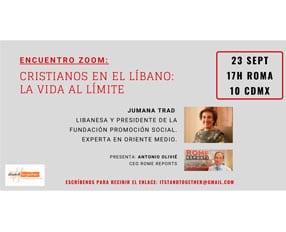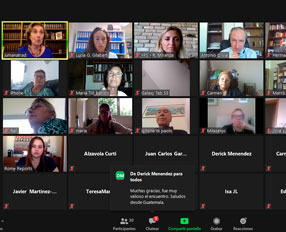The meeting via ZOOM “Lebanon: Life on the edge” with the Social Promotion Foundation’s President Jumana Trad took place on Wednesday 23 September, and was organised by Stand Together in Rome.
During the meeting, moderated by Antonio Olivié, CEO of Rome Reports, the situation in Lebanon after the explosion of August 4 and the situation of Christians in that country were analysed.
Throughout the meeting, Jumana Trad addressed different issues.
She analysed the situation in her country:
The situation in Lebanon is dramatic. Before the explosion on 4 August, the country was already immersed in an economic and social crisis, with hyperinflation, and is heavily indebted due to poor management by the administration. Since 2 October there have been demonstrations in the streets.
The explosion was the straw that broke the camel’s back. The shockwave has destroyed half of Beirut and directly affected half the population. The most damaged area is the Christian one.
People are in a state of shock, there have been a high number of deaths, injuries, and citizens who have lost their jobs, and the number of people who have been made homeless is estimated at 300,000. Eight hospitals (4 Catholic) have been destroyed and about 140 schools (mostly Catholic and Orthodox Christians) have been destroyed.
He stressed that Lebanon is an example of the coexistence of religions:
Lebanon is an example of freedom and an example of pluralism between East and West.
Lebanon, with 4 million inhabitants, plus Syrian refugees, has had the collaboration of its inhabitants who professed 18 different religious denominations.
Since the country was created, there has been a willingness on the part of its people to create a free and tolerant country. Thus Lebanon is the only country in the Region with religious freedom. There is a willingness to coexist among all religions, despite having gone through several crisis situations and a civil war.
In recent months, the blast coupled with the serious economic crisis has left the population demoralized. But the Lebanese are keeping their faith.
And she asked for help to support the Lebanese people and in particular the emergency projects following the explosion that the Social Promotion Foundation is promoting to help the population and to rebuild damaged buildings:
The Social Promotion Foundation has been working in Lebanon since 1991, only one year after the end of the civil war, and participated in the reconstruction of the country.
During the last few years we have worked on a large project in the area of health aimed at Syrian refugees and the vulnerable Lebanese population.
Since the blast we have launched three emergency campaigns, to help rebuilding a centre for training and leadership programmes for women in Beirut, to buy respirators for people in need, aggravated by the emission of toxic gases following the shockwave, and we are starting a campaign to help rebuild three churches in the city centre.
There has been the destruction of historical heritage, old houses. An assessment has been made of the extent, but it does not take into account the churches and mosques, although the number of affected churches is much higher as the Christian area is the most damaged.
Churches are a meeting place for the all the people, especially for people in vulnerable situations. It is very important to make an to help to rebuild the churches and get them back to normal activity.
The whole encounter is accessible from this link.
The meeting was organized by Stand Together, a digital platform created to give voice to all Christians living in situations of discrimination or persecution, especially Christians living in the Middle East.
It is a project promoted by the Communion and Liberation International Centre, the Association of Friends of Rome Reports, the ISCOM Association and the Social Promotion Foundation.






